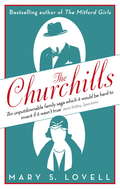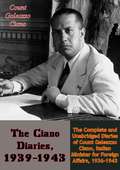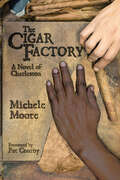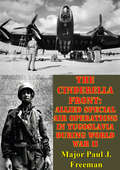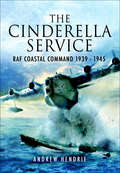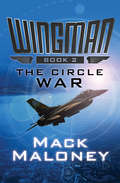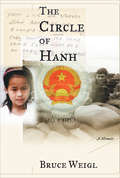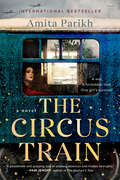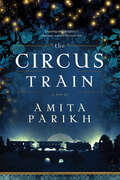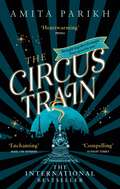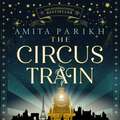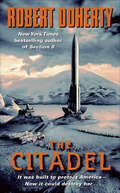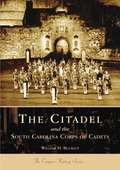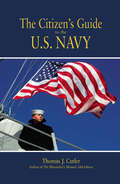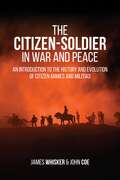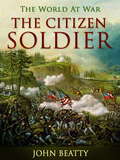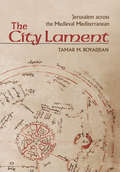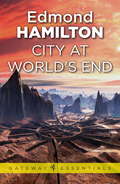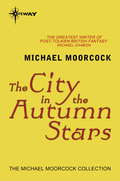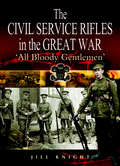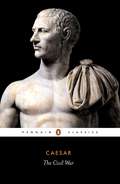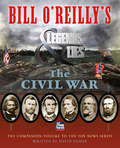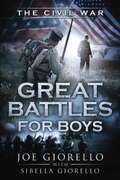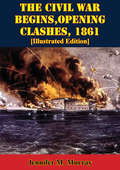- Table View
- List View
The Churchills: A Family at the Heart of History - from the Duke of Marlborough to Winston Churchill
by Mary S. LovellThere never was a Churchill from John of Marlborough down who had either morals or principles', so said Gladstone. From the First Duke of Marlborough - soldier of genius, restless empire-builder and cuckolder of Charles II - onwards, the Churchills have been politicians, gamblers and profligates, heroes and womanisers.The Churchills is a richly layered portrait of an extraordinary set of men and women - grandly ambitious, regularly impecunious, impulsive, arrogant and brave. And towering above the Churchill clan is the figure of Winston - his failures and his triumphs shown in a new and revealing context - ultimately our 'greatest Briton'.
The Ciano Diaries, 1939-1943: The Complete and Unabridged Diaries of Count Galeazzo Ciano, Italian Minister for Foreign Affairs, 1936-1943
by Count Galeazzo Ciano Hugh Gibson Sumner WellesThe inside story of international politics in Nazi-controlled Europe during World War II, told by the ultimate insider, Count Galeazzo Ciano—Italian Foreign Minister and son-in-law of Mussolini—who was ultimately charged as a traitor and killed by the Fascists in 1943.“In this state of mind, which excludes any falsehood, I declare that not a single word of what I have written in my diaries is false or exaggerated or dictated by selfish resentment. It is all just what I have seen and heard. And if, when making ready to take leave of life, I consider allowing the publication of my hurried notes, it is not because I expect posthumous revaluation or vindication, but because I believe that an honest testimonial of the truth in this sad world may still be useful in bringing relief to the innocent and striking at those who are responsible.”—(signed) GALEAZZO CIANO, December 23, 1943, Cell 27 of the Verona Jail.
The Cigar Factory: A Novel of Charleston (Story River Bks.)
by Michele MooreTwo women kept apart by segregation at a Southern cigar factory forge a powerful alliance in the labor rights movement in this historical novel.With evocative dialect and remarkable prose, The Cigar Factory tells the story of two entwined families—the white McGonegals and the African American Ravenels—in the storied port city of Charleston, South Carolina, during the World Wars. Moore’s novel follows the parallel lives of family matriarchs working on segregated floors of the massive Charleston cigar factory, where white and black workers remain divided and misinformed about the duties and treatment received by each other.Cassie McGonegal and her niece Brigid work upstairs in the factory rolling cigars by hand. Meliah Amey Ravenel works in the basement, where she stems the tobacco. While both suffer in the harsh working conditions of the factory and endure the sexual harassment of the foremen, segregation keeps them from recognizing their common plight until the Tobacco Workers Strike of 1945. Through the experience of a brutal picket line, the two women discover how much they stand to gain by joining forces, creating a powerful moment in labor history that gives rise to the Civil Rights anthem, “We Shall Overcome.” Moore’s historical research includes interviews with family members who worked at the cigar factory, adding nuance and authenticity to her empowering story of struggle, loss, and redemption.Foreword by New York Times best-selling author Pat ConroyWinner of the 2016 David J. Langum, Sr. Prize
The Cinderella Front: Allied Special Air Operations In Yugoslavia During World War II
by Major Paul J. FreemanThis research paper examines how special operations were conducted in Yugoslavia during WWII; how did the operational art conducted fit into Allied grand strategy; and how effective were these operations? These operations were conducted using multinational, coalition forces, and for this reason the lessons from this examination are relevant to warriors today.Conducting military operations almost always involve a scarcity of forces. This scarcity forces difficult decisions in development of strategic goals and conduct of operations. This difficulty is further compounded when coalition forces involve multiple nations, each with their own priorities. This is the situation that existed in WWII. The US wanted a concentrated invasion of NW Europe, while Britain and Russia were interested in a multi-front battle of attrition against the Axis, featuring a Balkan invasion. There were inadequate forces to commit to an invasion of the Balkans, but there was an opportunity to divert Axis strength from other fronts. This paper will look at Allied operations in Yugoslavia (typical Balkan operations) and analyze: 1.) the unique contextual factors influencing special operations in the Balkans during WWII, 2.) operational art factors of this unconventional employment of airpower in the politically divided region, and 3.) the success and/or failure of military planners and commanders in deriving military from strategic objectives and in attaining these objectives.The analysis and conclusions will examine the logic and congruence of these operations to the respective strategy and will highlight contextual influences (aircraft and equipment capabilities, weather, logistics) on the success of these operations to meet the strategic objective.
The Cinderella Service: RAF Coastal Command 1939 - 1945
by Andrew HendrieThis book reveals the vital contribution that RAF Coastal Command made to the Allies war effort. Although often referred to as the 'Cinderella Service' because by its nature, it did not gain the recognition it deserved and was overshadowed by Fighter and Bomber Commands and considering that it was not given priority in terms of aircraft and equipment, its wartime record was second to none.The two main roles of Coastal Command were anti-submarine work in the Atlantic and anti-shipping operations against enemy warships and merchant vessels. This work looks at every aspect of the command's work, equipment and aircraft and draws upon many first-hand accounts. Lengthy and comprehensive appendices cover Orders of Battle, Commanders, U boats sunk, ships sunk, aircraft losses and casualties.
The Circle War: Wingman, The Circle War, The Lucifer Crusade, Thunder In The East (Wingman #2)
by Mack MaloneyFlying over a shattered nation, ace pilot Hawk Hunter comes face to face with his greatest enemyThe United States may have defeated the Soviet Union in the Battle for Western Europe, but the Russians ended World War III with a nuclear sneak attack that shattered America into a collection of warring states dominated by criminals, fascists, and pirates. Air power rules all in the New Order, and pilots like Hawk Hunter are the only form of law. One of the most decorated pilots of the old US Air Force, he flies for the Pacific American Air Corps, a loose group of flyboys who have taken it upon themselves to safeguard what remains of US borders. Flying his U-2 over the frozen tundra late one night, Hunter detects something on his infrared camera: fifty jet fighters, accompanied by a full-scale invasion force. And their sides bear the emblem that frightens him most: the red star of the Soviet Union. World War IV is about to begin. The Circle War is the second book of the Wingman series, which also includes Wingman and The Lucifer Crusade.
The Circle of Hanh: A Memoir
by Bruce WeiglIn this piercingly honest memoir, Bruce Weigl, who has established himself as one of our finest American poets, explores the central experience of his life as a writer and a man: the Vietnam War, which tore his life apart and in return gave him his poetic voice. Weigl knew nothing about Vietnam before enlisting in 1967, but he saw a free ride out of a difficult childhood among volatile people. The war completely changed his life; there was a before and then one irrevocable after. In the before, the injured and beaten always had a chance; in the after, young men lay in his arms with throats torn by shrapnel, pleading with him not to tell their mothers how they had died. In the before, Weigl pretended to be dead in mock battles with his friends; in the after, he watched as a boy from his unit whispered to Vietnamese corpses while caring for their inert bodies as if they were dolls. Weigl returned from Vietnam unprepared to cope with life in the aftermath of war. One day he was squatting in a bunker, high on marijuana and waiting out a rocket attack; two days later he stood in his parents’ house, breathing the old air. For years, he struggled to adjust, sleeping in different rooms each night and leaping at a person’s throat if a hand reached to touch him in his sleep. He turned to alcohol, drugs, and women in an attempt to escape his confused purgatory, but only found himself alone, watching other people’s lives from the shadows. Eventually finding his way back into the world after a long time in a zone between being and not being, Weigl drew solace from poetry and, later, from a family. Yet, it is not until a harrowing journey back to Hanoi, to adopt a Vietnamese daughter, that Weigl is fully delivered from the brutal legacy of the war. This act of salvation and recompense to a nation he helped to destroy lies at the heart of his memoir and infuses it with a profound sense of humanity and transcendence. Moving from childhood to the war to a final act of compassion and hope, The Circle of Hanh is a powerful recreation of a deeply haunted life and, ultimately, a stunning work of redemption.
The Circus Train
by Amita ParikhInternational Bestseller and #1 LibraryReads Pick for December 2022Water for Elephants meets The Night Circus in this World War II debut about a magnificent travelling circus, a star-crossed romance, and one girl&’s coming-of-age during the darkest of times.&“A powerful reminder that to live is not just to survive, but to be seen and known for ourselves.&” —Pam Jenoff, author of The Orphan&’s TaleWhen all is lost, how do you find the courage to keep moving forward? 1938. Lena Papadopoulos has never quite found her place within the circus, even as the daughter of the extraordinary headlining illusionist, Theo. Brilliant and curious, Lena—who uses a wheelchair after a childhood bout with polio—yearns for the real-world magic of science and medicine, her mind stronger than the limitations placed on her by society. Then her unconventional life takes an exciting turn when she rescues Alexandre, an orphan with his own secrets and a mysterious past.As World War II escalates around them, their friendship blossoms into something deeper while Alexandre trains as the illusionist&’s apprentice. But when Theo and Alexandre are arrested and made to perform in a town for Jews set up by the Nazis, Lena is separated from everything she knows. Forced to make her own way, Lena must confront her doubts and dare to believe in the impossible—herself.
The Circus Train: A Novel
by Amita ParikhAt the World of Wonders, Europe’s most magnificent travelling circus, every moment is full of magic, and nothing is as it seems—especially for the people who put on the show Lena Papadopoulos has never quite found her place within the circus, even as the daughter of the extraordinary headlining illusionist, Theo. Brilliant and curious, Lena yearns for the real-world magic of science and medicine, despite her father’s overprotection and the limits her world places on her because she is disabled. Her unconventional life takes an exciting turn when she rescues Alexandre, an orphan with his own secrets and a mysterious past. Over several years, as their friendship flourishes and Alexandre trains as the illusionist’s apprentice, World War II escalates around them. When Theo and Alexandre are contracted to work and perform in a model town for Jews set up by the Nazis, Lena becomes separated from everything she knows. Forced to make her own way, Lena must confront her doubts and dare to believe in the impossible—herself.A must-read for fans of The Night Circus and Water for Elephants, The Circus Train will take readers on a heart-wrenching and spectacular two-decade journey across Europe. When all is lost, how do you find the courage to keep moving forward?
The Circus Train: The entrancing, magical international bestseller
by Amita ParikhTHE MAGICAL INTERNATIONAL BESTSELLER Brought together by magic. Torn apart by war. 'DAZZLING' Ellen Keith 'SUPERB' Reader Review (5 stars) 'EXTRAORDINARY' Kristin Harmel'PHENOMENAL' Reader Review (5 stars)'CAPTIVATING' Constance Sayers 'MESMERIZING' Reader Review (5 stars)'SPELLBINDING' Carol Windley _________Europe, 1938. Even as the daughter of the extraordinary headlining illusionist, Lena Papadopoulos has never quite found her place within the World of Wonders - a travelling circus that traverses the continent in a luxury steam engine. Brilliant and curious, Lena yearns for the real-world magic of science and medicine, despite the limitations she feels in her wheelchair. But when a young French orphan, Alexandre, comes aboard the circus train, Lena's life is infused with magic and wonder for the first time.But outside the bright lights of the circus, darkness is descending on Europe. War is about to shatter Lena's world, and take away everything she holds dear. And to recover what she has lost, Lena will have to believe in the impossible. A must-read for fans of Water for Elephants, The Circus Train will take readers on a heart-wrenching two-decade journey across a continent in which great beauty and unimaginable horror live side by side. _________'BEAUTIFUL' Reader Review (5 stars)'POWERFUL' Pam Jenoff 'DELIGHTFUL' Reader Review (5 stars) 'TRIUMPHANT' Lorelei Savaryn'EXQUISITE' Reader Review (5 stars)
The Circus Train: The entrancing, magical international bestseller
by Amita ParikhTHE MAGICAL INTERNATIONAL BESTSELLER Brought together by magic. Torn apart by war. 'A magical, vibrant parade of a novel about extraordinary people finding light in history's darkest decades. Spellbinding stuff' ERIN KELLY 'DAZZLING' Ellen Keith 'SUPERB' Reader Review (5 stars) 'EXTRAORDINARY' Kristin Harmel'PHENOMENAL' Reader Review (5 stars)'CAPTIVATING' Constance Sayers 'MESMERIZING' Reader Review (5 stars)'SPELLBINDING' Carol Windley _________Europe, 1938. Even as the daughter of the extraordinary headlining illusionist, Lena Papadopoulos has never quite found her place within the World of Wonders - a travelling circus that traverses the continent in a luxury steam engine. Brilliant and curious, Lena yearns for the real-world magic of science and medicine, despite the limitations she feels in her wheelchair. But when a young French orphan, Alexandre, comes aboard the circus train, Lena's life is infused with magic and wonder for the first time.But outside the bright lights of the circus, darkness is descending on Europe. War is about to shatter Lena's world, and take away everything she holds dear. And to recover what she has lost, Lena will have to believe in the impossible. A must-read for fans of Water for Elephants, The Circus Train will take readers on a heart-wrenching two-decade journey across a continent in which great beauty and unimaginable horror live side by side. _________'BEAUTIFUL' Reader Review (5 stars)'POWERFUL' Pam Jenoff 'DELIGHTFUL' Reader Review (5 stars) 'TRIUMPHANT' Lorelei Savaryn'EXQUISITE' Reader Review (5 stars)
The Citadel
by Robert DohertyIt was built to protect America. Now it could destroy the world. A pulse-pounding technothriller from the New York Times–bestselling author of Section 8.At the start of the Cold War, the greatest threat to America wasn’t the Russians and the looming Communist threat. Rather, it was an elite organization bent on world domination, a group so powerful only nuclear weapons could safeguard against them. The CIA knew what these men were capable of, and in a last-ditch attempt to protect America against them, they built two high–security arsenals deep within the earth––one declassified in the Nevada desert, and one heavily under wraps in Antarctica. For over fifty years, no one spoke of The Citadel, the fortress deep under the ice in Antarctica that held the most powerful weapon known to man––until the Organization returned, hellbent on destruction.Captain Jim Vaughn is a government agent known for performing missions no one else wants. So when an old colleague approaches him with an assignment, he can’t refuse––even if the mission has been set in motion by a dead man’s letter, found in Antarctica and dated 1949. The Citadel has been cracked, and the only man who can safeguard it is Vaughn. Nothing short of the fate of mankind rests on his shoulders.
The Citadel and the South Carolina Corps of Cadets (The Campus History Series)
by William H. BuckleySince its founding in 1842, The Citadel has provided generations of leaders to the state and nation. From its original purpose of providing an education to young men of South Carolina who would perform military duties for the state, it has evolved into an institution of national stature, highly regarded for both its academic reputation and its disciplined environment. Graduates of The Citadel have fought in every United States war since the Mexican War in 1846. Cadets have also achieved prominence in other fields, such as serving in leadership roles in state and national government, education, the professions, and business.
The Citizen's Guide to the U. S. Navy
by Thomas J. CutlerMost Americans know little about their Navy and learning about it can be daunting. But this informative yet highly accessible guide explains the sometimes strange ways of the U.S. Navy in terms civilians can understand. It addresses such things as the many titles military people have, the alphanumeric designations used to identify military personnel, the organization of the Navy and its many missions, the origin and practice of such things as saluting, flag etiquette, and side boys. Also included are an overview of the Navy's colorful history, a primer on Navy ships and aircraft, a guide to "reading" a uniform, and the demystification of the phonetic alphabet and military time. Designed as a quick read for those who want the full story, this handbook can also be used as a handy reference full of essential facts.
The Citizen-Soldier in War and Peace: An Introduction to the History and Evolution of Citizen Armies and Militias
by James Biser Whisker John R. CoeThe Citizen Soldier in War and Peace is a is a short historical look at the use of firearms in America and throughout the world this book appeals to anybody who believes in the Second Amendment or who is interested in the historical use of firearms
The Citizen-Soldier: Or; Memoirs Of A Volunteer (The World At War)
by John BeattyJohn Beatty (December 16, 1828 – December 4, 1914) was an American banker and statesman from Sandusky, Ohio. He served as a brigadier general in the Union Army during the American Civil War. (Excerpt from Wikipedia)
The City Girl's Homecoming (Furever Yours #5)
by Kathy DouglassEight dogs, eight cats…and one ornery cowboy!Megan Jennings just found the ideal temporary home for sixteen suddenly displaced pets. Too bad the farm’s owner isn’t giving the two-legged, former New York attorney the same warm welcome. A city girl broke Cade Battle’s heart and no way the gun-shy cowboy’s trusting in the feelings Megan awakens. But after being orphaned as a teenager, Megan knows she’s finally found her forever family. Can she make Cade believe it, too?
The City Lament: Jerusalem across the Medieval Mediterranean
by Tamar M. BoyadjianPoetic elegies for lost or fallen cities are seemingly as old as cities themselves. In the Judeo-Christian tradition, this genre finds its purest expression in the book of Lamentations, which mourns the destruction of Jerusalem; in Arabic, this genre is known as the ritha al-mudun. In The City Lament, Tamar M. Boyadjian traces the trajectory of the genre across the Mediterranean world during the period commonly referred to as the early Crusades (1095–1191), focusing on elegies and other expressions of loss that address the spiritual and strategic objective of those wars: Jerusalem. Through readings of city laments in English, French, Latin, Arabic, and Armenian literary traditions, Boyadjian challenges hegemonic and entrenched approaches to the study of medieval literature and the Crusades.The City Lament exposes significant literary intersections between Latin Christendom, the Islamic caliphates of the Middle East, and the Armenian kingdom of Cilicia, arguing for shared poetic and rhetorical modes. Reframing our understanding of literary sources produced across the medieval Mediterranean from an antagonistic, orientalist model to an analogous one, Boyadjian demonstrates how lamentations about the loss of Jerusalem, whether to Muslim or Christian forces, reveal fascinating parallels and rich, cross-cultural exchanges.
The City at World's End: Large Print (Gateway Essentials #426)
by Edmond HamiltonOne moment Kenniston was strolling down the quiet street, lost in pleasant reverie. The next moment the sky split open!It split wide open, and above them was a burn and a blaze of light - so swift, so violent, that the air itself seemed to have burst into flame. Then there was silence - awful, suffocating silence. Kenniston felt the chill of premonition - a shapeless terror that grew into a thing too evil to be borne alone.
The City in the Autumn Stars
by Michael MoorcockThe City In The Autumn Stars: Being A Continuation Of The Story Of The Von Bek Family And Its Association With Lucifer, Prince Of Darkness, And The Cure For The World's Pain.Disillusioned by the excesses of the French Revolution, Manfred von Bek flees to the city of Mirenburg, where a Scottish balloonist, an elusive duchess, and a fallen angel become his companions on a journey to the mystical Mittelmarch - the land between lands- in search of the Holy Grail.
The Civil Service Rifles in the Great War: 'All Bloody Gentlemen'
by Jill KnightMade up entirely of volunteer civil servants and their friends and despite the Government's reluctance to release them, the Prince of Wales' Own Civil Service Rifles fought with distinction at Loos, the Somme, Messines, Cambrai, Salonika and Palestine. As casualties mounted, the Rifles' spirit and loyalties strengthened. The Author draws on numerous personal accounts, graphically written, as well as official records.
The Civil War
by Julius CaesarA military leader of legendary genius, Caesar was also a great writer, recording the events of his life with incomparable immediacy and power. The Civil War is a tense and gripping depiction of his struggle with Pompey over the leadership of Republican Rome - a conflict that spanned the entire Roman world, from Gaul and Spain to Asia and Africa. Where Caesar's own account leaves off in 48 BC, his lieutenants take up the history, describing the vital battles of Munda, Spain and Thapsus, and the installation of Cleopatra, later Caesar's mistress, as Queen of Egypt. Together these narratives paint a full picture of the events that brought Caesar supreme power - and paved the way for his assassination only months later.
The Civil War (Bill O'reilly's Legends And Lies Ser.)
by David Fisher<p>The newest installment in the New York Times #1 bestselling companion series to the Fox historical docudrama, Bill O’Reilly’s Legends and Lies; The Civil War is a pulse-quickening account of the deadliest war in American history. <p>From the birth of the Republican Party to the Confederacy’s first convention, the Underground Railroad to the Emancipation Proclamation, the Battle of Gettysburg to the assassination of Abraham Lincoln, Bill O’Reilly’s Legends and Lies: The Civil War reveals the amazing and often little known stories behind the battle lines of America’s bloodiest war and debunks the myths that surround its greatest figures, including Harriet Tubman, Abraham Lincoln, General Robert E. Lee, Frederick Douglass, Stonewall Jackson, John Singleton Mosby, Ulysses S. Grant, Jefferson Davis, John Wilkes Booth, William Tecumseh Sherman, and more. <p>An epic struggle between the past and future, the Civil War sought to fulfill the promise that “all men are created equal.” It freed an enslaved race, decimated a generation of young men, ushered in a new era of brutality in war, and created modern America. <p> Featuring archival images, eyewitness accounts, and beautiful artwork that further brings the history to life, The Civil War is the action-packed and ultimate follow-up to the #1 bestsellers The Patriots and The Real West. <P><b>A New York Times Bestseller</b>
The Civil War (Great Battles for Boys)
by Sibella Giorello Joe GiorelloGreat Battles for Boys is a history series that sends young readers “into the fight.” Boys learn about the military leaders, weapons, and strategies that won—or lost—history's most important military battles. <p><p> The American Civil War <p> More Americans died in this war than all other wars combined—more than 600,000 soldiers. <p><p> But what REALLY happened? <p><p> From the first shots at Fort Sumter to the South's surrender at Appomattox, young readers move chronologically through 20 crucial battles, covering all four years of the Civil War. They'll discover which strategies, tactics, and weapons were used, and which military leaders won victory—or suffered defeat.
The Civil War Begins, Opening Clashes, 1861 [Illustrated Edition] (The U.S. Army Campaigns of the Civil War #1)
by Jennifer M. MurrayIncludes 6 maps and numerous other illustrationsThe Civil War Begins: Opening Clashes, 1861 is the first in a series of campaign brochures commemorating our national sacrifices during the American Civil War. Author Jennifer Murray examines the successes and challenges of both the Union and the Confederate forces during the early days of the Civil War. Notable battles discussed include: Fort Sumter, South Carolina; Bull Run, Virginia; Wilson's Creek, Missouri; Cape Hatteras, North Carolina; and Port Royal, South Carolina.
